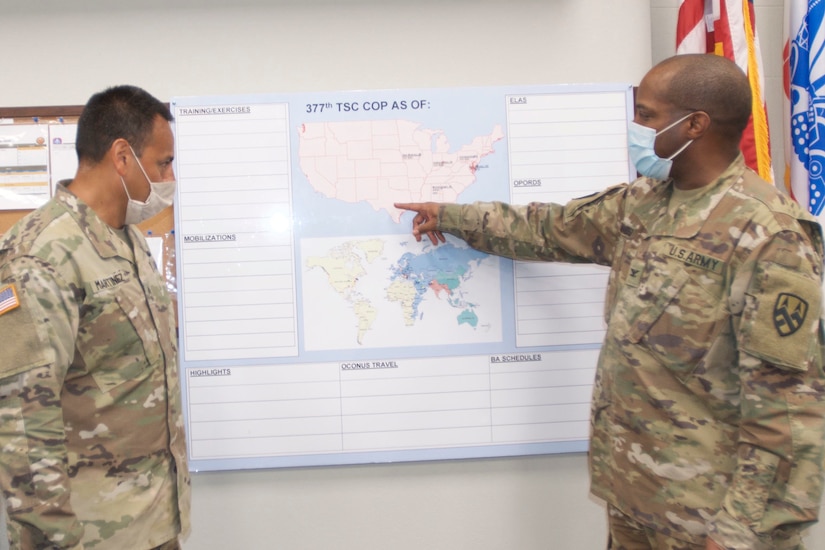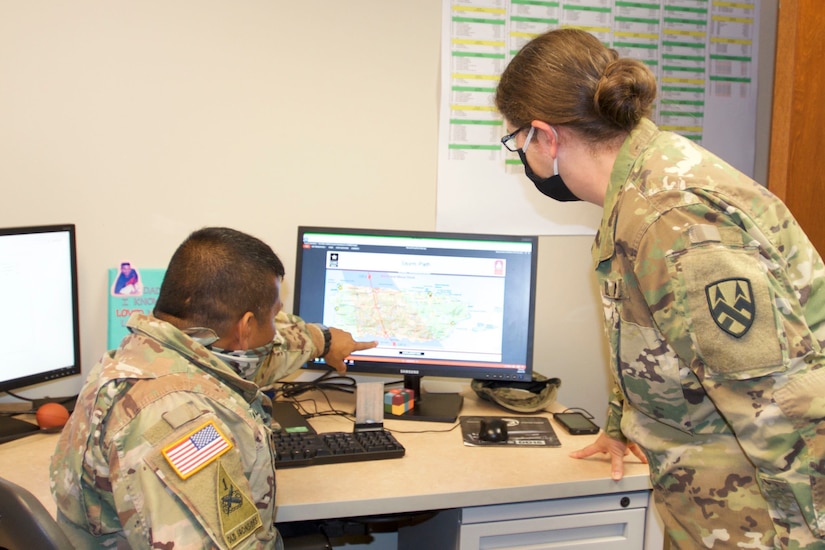Beginning in March, the Army Reserve's 377th Theater Sustainment Command oversaw a nationwide logistics response effort out of its home station in Belle Chasse, Louisiana, that supported thousands of service members in the fight against COVID-19. The scale of the mission was unprecedented, and required multitiered planning, equipment projection and coordination to achieve. As the response concluded, the command was tasked with a new and far more challenging assignment: preparing for this year's hurricane season in the age of COVID-19.

"Not only do we have to respond to a hurricane, we have to do it in a COVID environment, which is more resource- and planning-intensive on all levels to respond to," said Army Maj. David Finn, a plans officer at the command. "We've been planning this for almost two months now in preparation for it and trying to forecast the sustainment requirements to respond to a disaster event."
The command is in uncharted territory, bridging the gap between its traditional role in support of the Army Reserve Command and its newfound role as the lead logistics supplier for U.S. Army North, which supervises homeland defense and defense support to civil authorities missions throughout North America.
Hurricane season traditionally poses a logistics challenge to any supporting agency. The unpredictable path and varying severity of storms make long-term projections for placement of responding assets difficult. Despite this, the plans team has conducted coordination across the country to ensure essential capabilities such as water purification, transportation and medical support are able to respond as quickly as possible to the point of impact.
The partnership with Army North has been an invaluable learning process for Finn and his fellow soldiers, who speak highly of the knowledge and experience the Army North team brought to the fight.
"Working with Army North has been a new experience for me, and it's been a learning experience from the start," he said. "It helps me understand our larger responsibility to national defense and disaster support requirements."
Despite the increased coordination, operating in a COVID-19 environment has caused some limitations to the command's ability to prepare for hurricanes, as opposed to previous years. The annual Hurricane Certification Exercise, a mock scenario-based response staged in areas that are historically vulnerable to hurricanes, was cancelled this year over concerns that personnel could be exposed to COVID-19.
"Hurricane Maria completely overwhelmed Puerto Rico in 2017, so we staged the exercise there last year so we could learn from our shortcomings in the response and address those issues there," said Army Chief Warrant Officer 4 Dorian Bozza, the senior maintenance technician at the 377th Theater Sustainment Command. "Unfortunately because of COVID, there is no certification exercise this year, but we are still planning and coordinating with Army North to continue to monitor the weather and respond."

This coordination involves sending a command liaison officer to any state that is facing a potential hurricane landfall. The officer then integrates into the logistics planning process to coordinate with the state and federal agencies to ensure any personnel or equipment requirements are met prior to landfall.
COVID-19 has offered up one benefit to the command, however.
"We have more people now than ever before," Bozza said. "In previous seasons, we had a far more limited staff, but now we have almost the whole [team] mobilized for the hurricanes because of the complexity of responding during COVID-19."
After the loss of the full-scale certification exercise, the command held an extensive rehearsal of concept drill July 9 to demonstrate its capability to respond to Army North at its headquarters at Joint Base San Antonio, Texas. The ROC drill covered a series of potential hurricane landfall scenarios and involved contingency planning for the entire continental United States, Puerto Rico and the U.S. Virgin Islands.
"There's been a lot of preparation time and a lot of rehearsals where we actually practice how we would respond," said Army Col. Reggie Richardson, 377th Theater Sustainment Command deputy chief of staff for operations. "The ROC drill is a way for all teams involved to be mindful of the intent behind the mission and understand what their counterparts are doing during the mission."
With six Atlantic storms already named by the National Oceanic and Atmospheric Administration, the projected busy hurricane season has already gotten off to a quick start. The command has nearly doubled its normal staff in preparation for the season, in tandem with a similar increase in staff at the 4th Sustainment Command (Expeditionary), the subordinate unit assisting the 377th Theater Sustainment Command in its hurricane response mission.
With increased support and the lessons learned from previous hurricane seasons and the COVID-19 response, Richardson expressed nothing but confidence in the command's ability to respond to the hurricanes both effectively and safely.
"We're transitioning to the speed required and dealing with organizations we have not dealt with before," he said. "New people, new teams, new structures and new organizations…but the positive thing is, it's all coming together."
(Army Capt. Matthew Cline is assigned to the 377th Theater Sustainment Command.)






